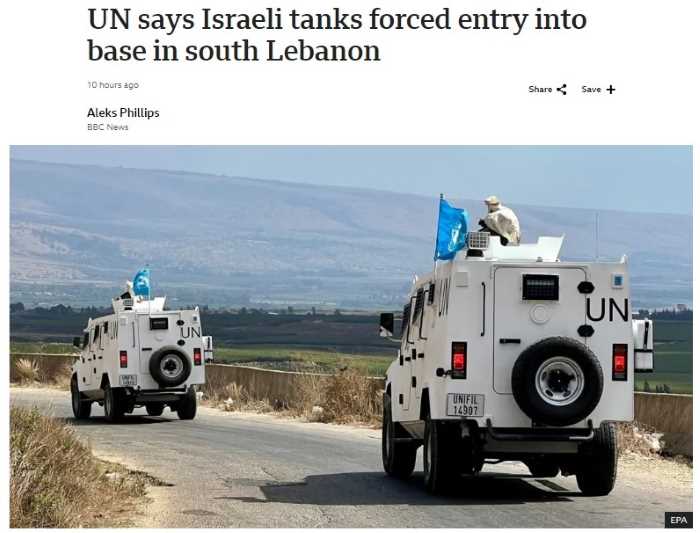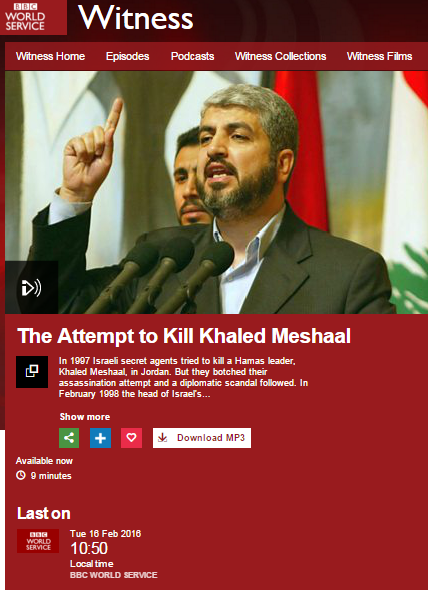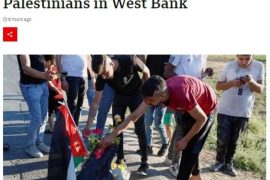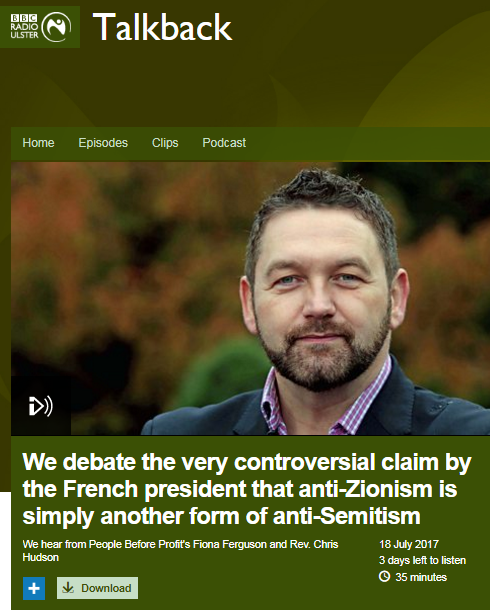Over the past week or so, visitors to the BBC News website – and in particular its ‘Middle East’ and ‘Republic of Ireland’ pages – have seen no small amount of content amplifying the talking points of the UN, UNIFIL and additional parties: [emphasis added]
“Israeli forces proximity to Irish troops in Lebanon ‘concerning’”, 7/10/24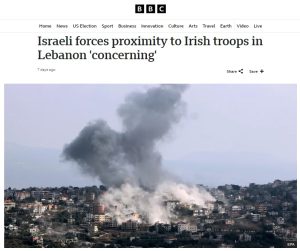
“Israeli Defence Forces’ (IDF) proximity to an outpost where a number of Irish troops are stationed is “concerning”, according to the United Nations Interim Force in Lebanon (UNIFIL).
Andrea Tenenti from UNIFL says that the IDF are currently a few hundred metres from camp UN-652, reports the Irish state broadcaster RTÉ.
The proximity of the IDF to Irish UN troops has caused high levels of concern within United Nations Headquarters as fighting continues between Israel and Hezbollah.”
“Irish troops ‘accounted for’ after reported Lebanon strike”, Aoife Moore and Hayley Halpin 11/10/24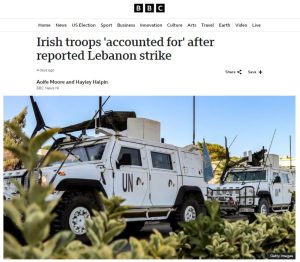
“The proximity of the IDF to Irish UN troops has caused high levels of concern within United Nations headquarters as fighting continues between Israel and Hezbollah.
UNIFIL said on Thursday that “recent escalation along the Blue Line is causing widespread destruction of towns and villages in south Lebanon, while rockets continue to be launched towards Israel, including civilian areas”.
“In the past days we have seen incursions from Israel into Lebanon in Naqoura and other areas. Israel Defense Forces soldiers have clashed with Hizbullah elements on the ground in Lebanon,” UNIFIL said.
It said its Naqoura headquarters and nearby positions have been “repeatedly hit”.”
“US urges Israel to stop shooting at UN peacekeepers in Lebanon”, Jack Burgess, 11/10/24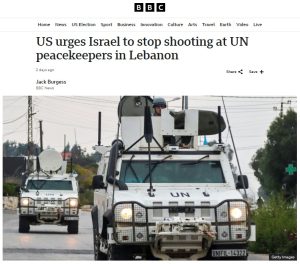
“The head of UN peacekeeping said there was reason to believe some firing on UN positions in southern Lebanon had been direct, though he did not ascribe responsibility for the incidents.
“For example we have a case where a tower was hit by a fire and also damages to cameras at one of the positions – which obviously to us very much looked like direct fire,” Jean-Pierre Lacroix told the BBC’s Newshour programme.”
“No 10 ‘appalled’ by Israel attacks on UN bases”, 11/10/24
“UN General Secretary Antonio Guterres said firing on peacekeepers was a “violation of international humanitarian law”.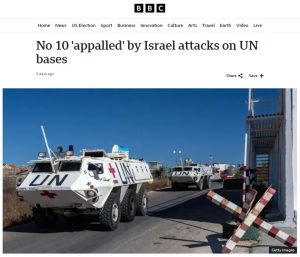
“These peacekeepers must be protected,” he said.
Andrea Tenenti, a spokesman for Unifil, said recent attacks on UN bases look like “more of a deliberate attack against our troops, who have been in the south to try to bring back stability”.
Asked about the attacks, a Downing Street spokesperson said it was “vital that peacekeepers and civilians are protected” and reiterated calls for an immediate ceasefire.”
“Israel attacks on UN in breach of international law, Harris says”, Caitriona Perry, 12/10/24
“On Friday evening, the head of UN Peacekeeping Jean-Pierre Lacroix said there is reason to believe some of Israel’s firing at peacekeepers in Lebanon was direct.
“We have reason to believe that in some cases the firing has been direct,” he told BBC’s Newshour programme.” […]
“Israel alleges that that the UN has failed to enforce the 1701 resolution which called for a demilitarised zone and the disarmament of Hezbollah and this was partly to blame for the current conflict.
For its part, UNIFIL has said Israel’s ground invasion of southern Lebanon constitutes a violation of resolution 1701.”
“Fifth peacekeeper wounded in southern Lebanon, UN says”, Christy Cooney, 12/10/24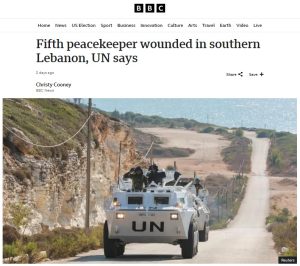
“In a statement on Saturday, Unifil said the peacekeeper was injured at its headquarters in the southern city of Naquora on Friday night amid “ongoing military activity nearby”, though added that it did not know the origin of the fire.” […]
“”We remind all actors of their obligations to ensure the safety and security of UN personnel and premises, including avoiding combat activities near Unifil positions,” the mission said.”
It therefore did not come as much of a surprise to find the BBC News website promoting another story about UNIFIL on the afternoon of October 13th.
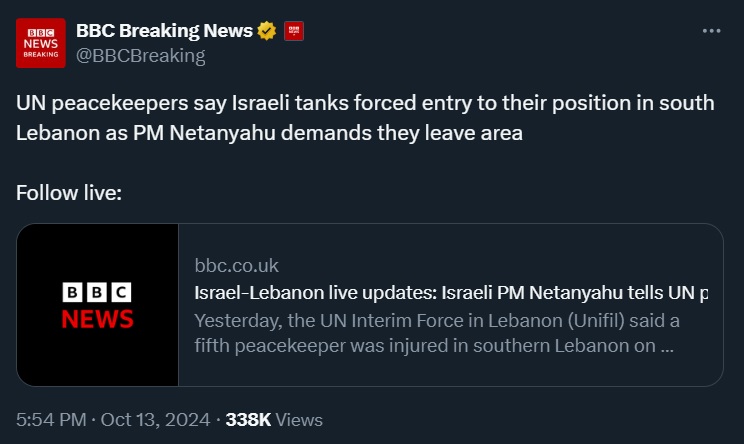
The live page to which that post directs social media users includes the following entries:
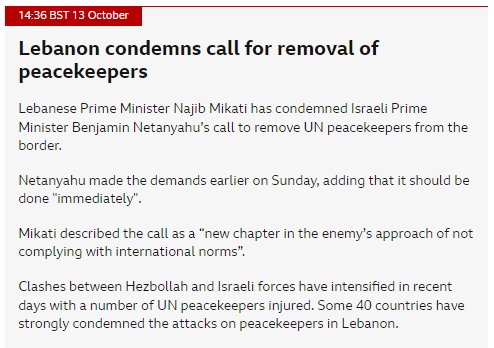
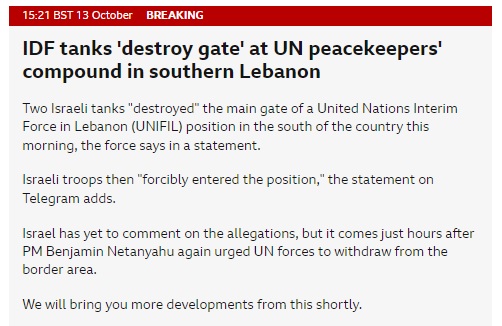
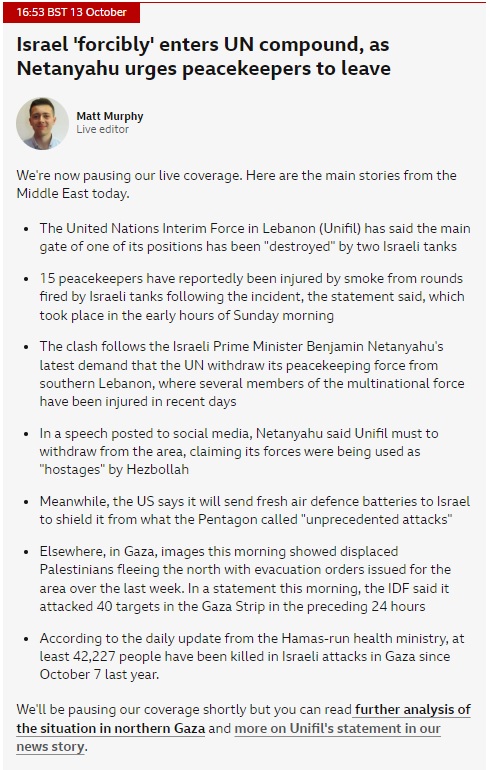
On the evening of October 13th, the BBC also promoted a written report concerning that incident.
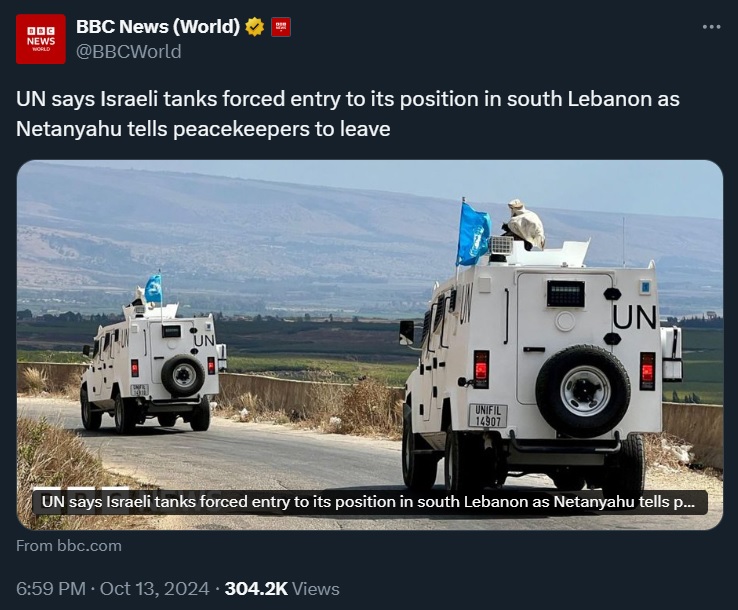
The original version of that report by London-based Aleks Phillips (published at around 7 p.m. Israeli time) was headlined “UN says Israeli tanks forced entry into one of its positions in south Lebanon” and told BBC audiences that:
“The UN peacekeeping force in southern Lebanon says Israeli tanks forced their way into one of its positions early on Sunday morning, the latest in a series of incidents in recent days.
In a statement, the UN Interim Force in Lebanon (Unifil) said two Israel Defense Forces (IDF) tanks destroyed the main gate of a post in Ramyah, near the border with Israel, and “forcibly entered the position” to request it turn out its lights.
About two hours later, it said rounds were fired nearby that saw smoke enter the camp, causing 15 peacekeepers to suffer skin irritations and gastrointestinal reactions.
These incidents were “shocking violations”, it said. […]
It [UNIFIL] described the breach of its post in Ramyah as “a further flagrant violation of international law”.”
Around half an hour after the BBC uncritically published that obviously unverified account of events, the IDF put out statements in Hebrew, English and Arabic.
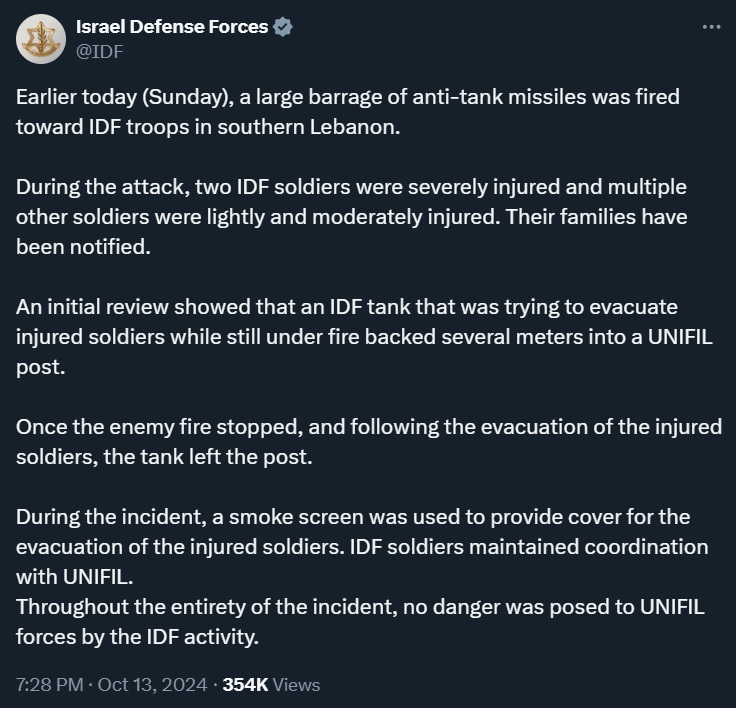
As reported by the Jerusalem Post:
“The IDF said Hezbollah had fired anti-tank missiles at Israeli troops, wounding 25 of them. The attack was very close to a UNIFIL post, and a tank helping evacuate the casualties under fire then backed into the UNIFIL post, it said.
“It is not storming a base. It is not trying to enter a base. It was a tank under heavy fire, mass casualty event, backing up to get out of harm’s way,” the military’s international spokesperson Nadav Shoshani told reporters.
In a statement, the military said it used a smoke screen to provide cover for the evacuation of the wounded soldiers, but its actions posed no danger to the UN peacekeeping force.”
Notably, UNIFIL had nothing to say about Hizballah terrorists firing anti-tank missiles close to a UNIFIL post.
About an hour and a half after its initial publication, Phillips’ report was retitled “UN says Israeli tanks forced entry into base in south Lebanon” and amended to present a typical ‘he said-she said’ account of the story, the current version of which reads as follows: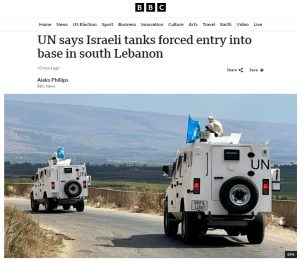
“The UN peacekeeping force in southern Lebanon says Israeli tanks forced their way into one of its positions early on Sunday morning.
In a statement, the UN Interim Force in Lebanon (Unifil) said two Israel Defense Forces (IDF) tanks destroyed the main gate of a post in Ramyah, near the Israeli border, and “forcibly entered the position” to request it turn out its lights.
About two hours later, it said rounds were fired nearby that saw smoke enter the camp, causing 15 peacekeepers to suffer skin irritations and gastrointestinal reactions.
The IDF offered a different version of events, saying it had encroached on a Unifil position to evacuate soldiers who had been wounded by an anti-tank missile.
It said two soldiers had been “seriously injured” in the attack, with others suffering lesser degrees of injury.
“For the sake of evacuating the wounded, two tanks drove backwards, in a place where they could not advance otherwise in light of the threat of shooting, a few metres towards the Unifil position,” the IDF said.
It added that during the incident, a smoke screen was fired to aid the evacuation – and that it had “maintained continuous contact” with Unifil, stressing there was “no threat to the Unifil force from IDF activities”.”
As for visitors to the BBC News website’s live page, they had to wait nearly fourteen hours before they could discover that the account they had been given – including implied linkage between the incident and Netanyahu’s earlier statement – was misleading and that there was a “different version of events”.
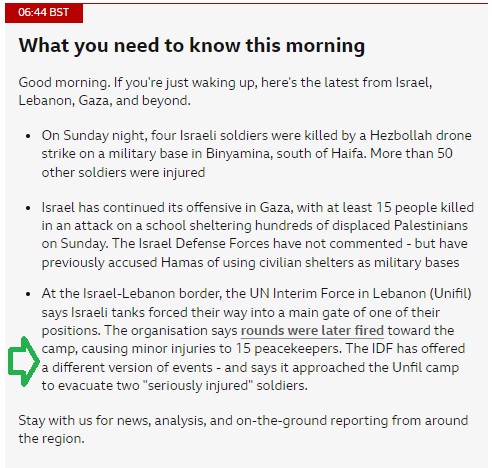
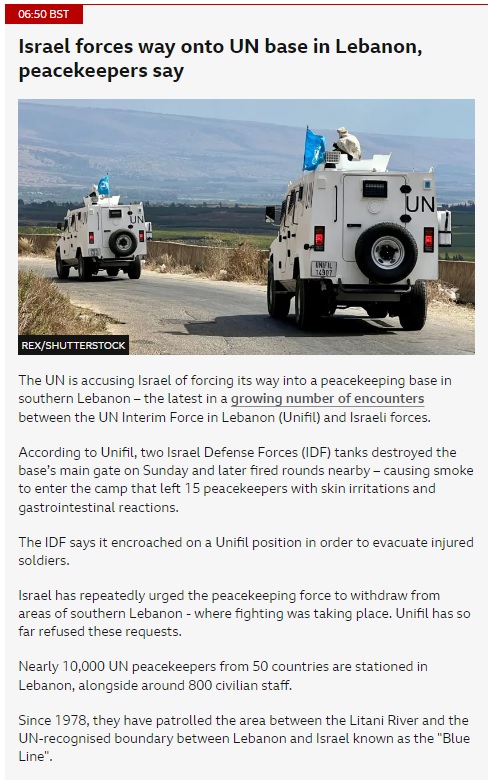
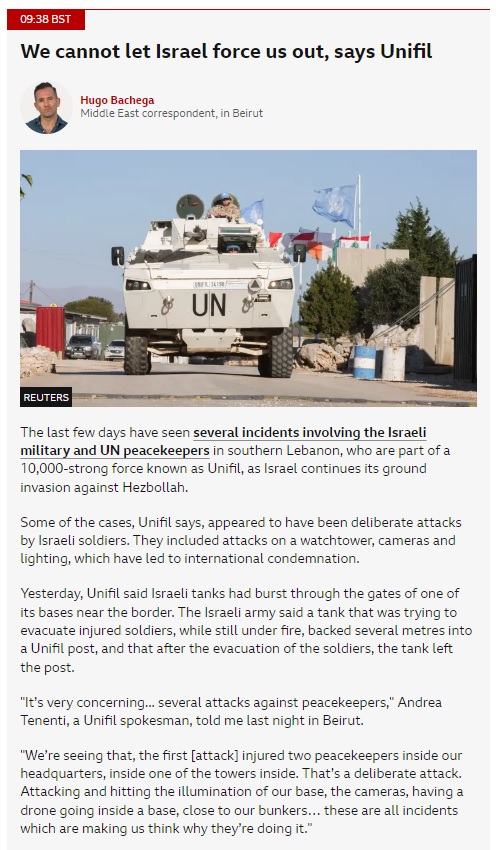
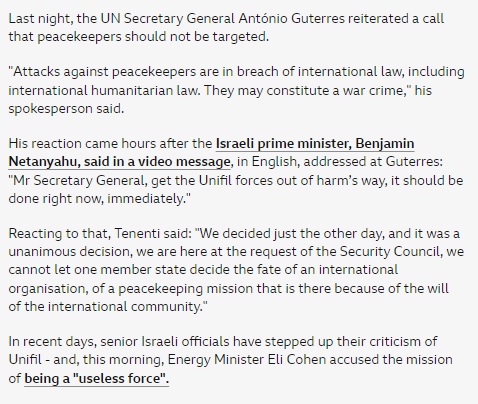
That live page entry from Hugo Bachega of the BBC’s Beirut bureau is based on a filmed report (from 01:51) he produced for the BBC News Channel in which he inaccurately claimed that: “Today, UN peacekeepers came under Israeli attack – again” and provided Tenenti with the cue to promote claims of “deliberate” attacks by Israel. Bachega opened his distinctly uninformative report by stating:
“They are deployed to keep the peace in southern Lebanon but there’s no peace left to keep.”
As is typical in BBC reporting, he failed to make any effort whatsoever to inform viewers that UNIFIL is responsible for the fact that “there’s no peace” due to that organisation’s 18-year long failure to apply the terms of UN Security Council resolution 1701, according to which the terrorist organisation Hizballah should not be located in southern Lebanon. Moreover, Bachega closed his report with the following inaccurate and partial claim:
“Israel says it is targeting Hizballah in Lebanon but the entire country is under attack, even the UN.”
For years – and even throughout the past year of the war initiated by Hizballah on October 8th 2023 – the BBC has serially avoided telling its audiences about the failure of the international community, the UN and its ‘interim peacekeeping force’ UNIFIL (with its annual cost of over $550 million) to enforce the terms of UNSC resolution 1701.
That context is essential for understanding of how and why the current situation on the ground in northern Israel and southern Lebanon came about, including weapons caches and rocket fire in the proximity of UNIFIL posts, which the IDF now has to clear in order to protect Israeli civilians.
It would appear, however, that the BBC’s chosen framing of this story now includes facilitation of UNIFIL portrayal of itself as the victim of supposedly deliberate “attacks on peacekeepers” as a means of trying to “force us out”.
Related Articles:
BBC NEWS WEBSITE DOCUMENTATION OF WEAPONS IN SOUTHERN LEBANON
MORE 1701 ERASURE IN BBC REPORTING FROM SOUTHERN LEBANON

